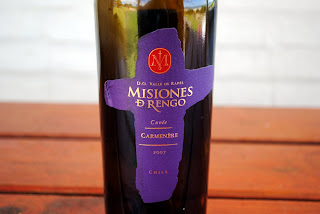Gracias, Roberto.
¿Porqué pensamos que la cultura del vino es cara?
Cómo verán, esto ayuda a buscar el "best value".
Go for it.
And enjoy.
jueves, 1 de noviembre de 2012
martes, 23 de octubre de 2012
www.artesanawinery.com
Este viñedo puede ser un lugar interesante para ir en el mes de Noviembre.
Avisen.
Avisen.
martes, 4 de septiembre de 2012
miércoles, 15 de agosto de 2012
jueves, 12 de julio de 2012
miércoles, 11 de julio de 2012
miércoles, 2 de mayo de 2012
lunes, 9 de abril de 2012
miércoles, 4 de abril de 2012
martes, 20 de marzo de 2012
jueves, 8 de marzo de 2012
Founding Father!
No nation is drunken where wine is cheap,
and none sober where the dearness of wine substitutes
ardent spirits as the common beverage.
Wine brightens the life and thinking of anyone."
Thomas Jefferson, 1800s
and none sober where the dearness of wine substitutes
ardent spirits as the common beverage.
Wine brightens the life and thinking of anyone."
Thomas Jefferson, 1800s
sábado, 3 de marzo de 2012
lunes, 27 de febrero de 2012
Hablando de Borges...
SONETO DEL VINO ¿En qué reino, en qué siglo, bajo qué silenciosa conjunción de los astros, en qué secreto día que el mármol no ha salvado, surgió la valerosa y singular idea de inventar la alegría? Con otoños de oro la inventaron. El vino fluye rojo a lo largo de las generaciones como el río del tiempo y en el arduo camino nos prodiga su música, su fuego y sus leones. En la noche del júbilo o en la jornada adversa exalta la alegría o mitiga el espanto y el ditirambo nuevo que este día le canto otrora lo cantaron el árabe y el persa. Vino, enséñame el arte de ver mi propia historia como si ésta ya fuera ceniza en la memoria.
|
sábado, 25 de febrero de 2012
Más evidencias del American Journal of Enology and Viticulture, 2011
Antioxidant Effects
The antioxidant effects associated with moderate wine drinking may be one of the factors responsible for the French Paradox. A high fat diet is known to cause high levels of oxidative damage to plasma lipoproteins, which is counteracted by antioxidants present in wine. Oxidative stress is also associated with chronic diseases, including atherosclerosis, heart failure, cancer, and neurological degeneration, and is believed to accelerate the aging process. Red wine has been shown to protect against each of these conditions by increasing plasma antioxidant capacity, suppressing reactive oxygen species generation, increasing serum oxygen radical absorbance capacity, and decreasing oxidative DNA damage. The oxidation of LDL cholesterol is strongly associated with cardiovascular disease. It has been demonstrated that wine flavonoids protect against LDL oxidation (Aviram and Fuhrman 2002,Ursini and Sevanian 2002). Wine procyanidins have been shown to be especially active in preventing lipid oxidation of foods while in the digestive tract, indicating that red wine consumption with a meal affords the most protection (Ursini and Sevanian 2002).
martes, 21 de febrero de 2012
miércoles, 15 de febrero de 2012
lunes, 6 de febrero de 2012
domingo, 5 de febrero de 2012
Defina "mamerto"
mamerto: | sinónimos | definición RAE | conjugar verbos en contexto | imágenes en Inglés | en Francés | en Portugués |
Diccionario de la lengua española © 2005 Espasa-Calpe:
mamerto,ta
- adj. desp. Tonto,lechuguino:
es un poco mamerto y provinciano.
sábado, 4 de febrero de 2012
Wine and health
Wine and Health: A Review
+Author Affiliations
- ↵* Corresponding author (email: pezzuto@hawaii.edu; fax: 808 933-2981)
Abstract
As indicated by epidemiological studies, regular and moderate wine consumption, particularly red wine, has been associated with health benefits. Clinical studies and work performed with animal models indicate that wine may protect against cardiovascular disease, atherosclerosis, hypertension, certain types of cancer, type 2 diabetes, neurological disorders, and metabolic syndrome. The mechanism of action has been attributed to antioxidant, lipid regulating, and anti-inflammatory effects. A variety of wine constituents have been studied in various disease models. Both the alcoholic and polyphenolic components of wine are believed to contribute to these beneficial effects. As wine is a complex mixture, it is likely that a multitude of chemical constituents, as well as their metabolites, work synergistically to impact human health. In sum, although wine drinking may be contraindicated in certain individuals, in healthy people, regular consumption of moderate amounts of wine may protect against certain chronic health conditions.
lunes, 30 de enero de 2012
domingo, 22 de enero de 2012
sábado, 14 de enero de 2012
viernes, 13 de enero de 2012
El recomendado de la semana
Un hallazgo.
Barco con la mejor "collezzione" de vinos italianos...
Muy recomendable si andan cerca...vean la nota de cata.
Barco con la mejor "collezzione" de vinos italianos...
Muy recomendable si andan cerca...vean la nota de cata.
martes, 3 de enero de 2012
Suscribirse a:
Entradas (Atom)

















